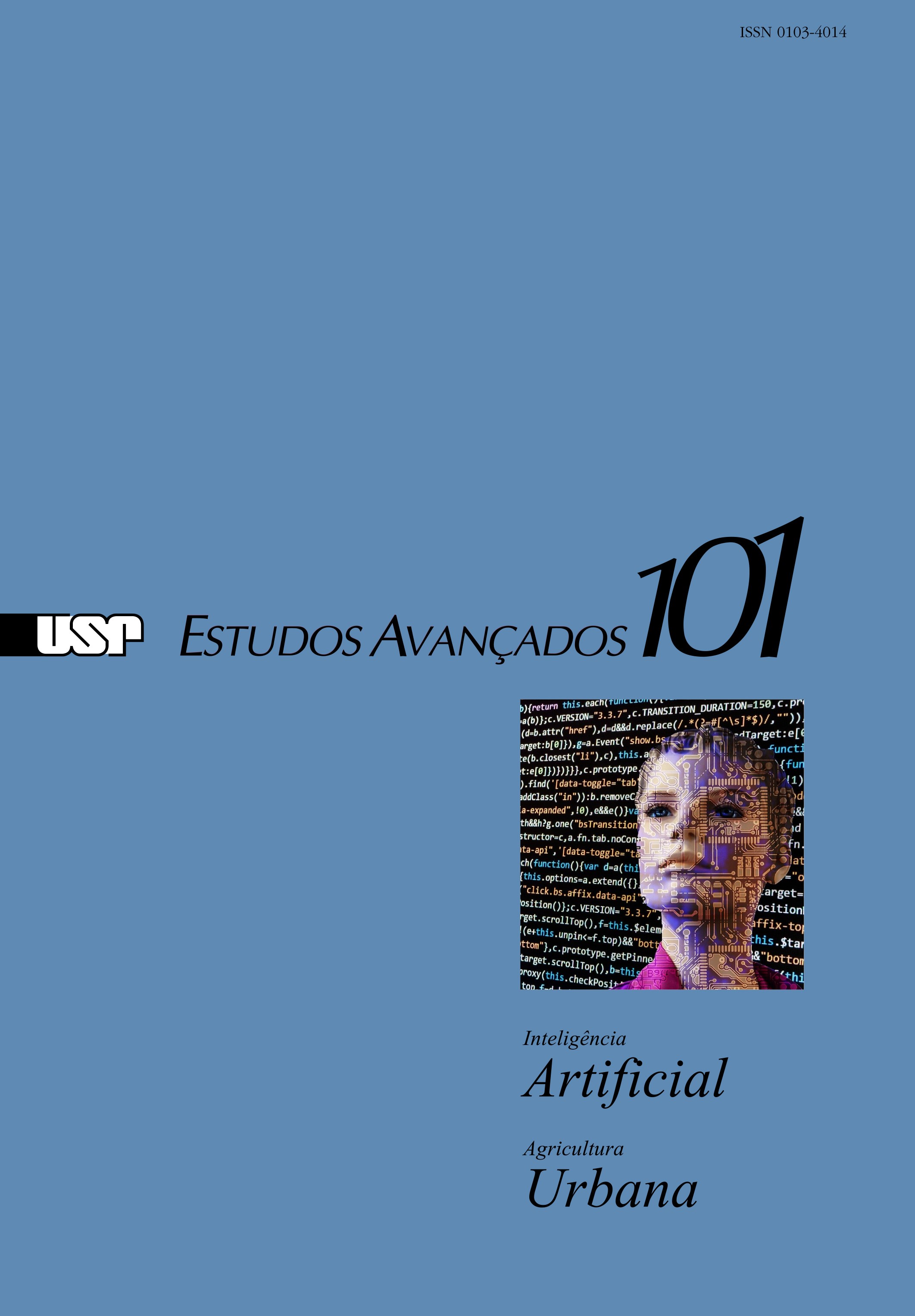Inteligência Artificial e sociedade: avanços e riscos
DOI:
https://doi.org/10.1590/s0103-4014.2021.35101.004Palavras-chave:
Inteligência Artificial, Agentes inteligentes, Sistemas multiagentes, Agentes normativos, Regulação de sistemas autônomosResumo
Este artigo tem como objetivo prover informações para que o leitor comum possa melhor entender os principais aspectos da IA, em que ela difere da computação convencional e como ela pode ser inserida nos processos organizacionais da sociedade humana. Além disso, busca evidenciar os grandes avanços e potenciais riscos que essa tecnologia, tal como qualquer outra, pode provocar caso os atores envolvidos na sua produção, utilização e regulação não criem um espaço de discussão adequado destas questões.
Downloads
Referências
AI4G. AI for social good, IJCAI 2019 Workshop, Macao, China. Disponível em: .
APPELBAUM, S. H. Socio-technical systems theory: an intervention strategy for organizational development. Management Decision, v.35, n.6, 1997.
ART-AI. Centre for Doctoral Training in Accountable, Responsible and Transparent
AI, University of Bath, UK, 2019. Disponível em: <https://cdt-art-ai.ac.uk/>.
BAZZAN, A. L. et al. Evolution of agents with moral sentiments in an iterated prisoner’s
dilemma exercise. In: Game theory and decision theory in agent-based systems. Springer.
p.43-64.
BOISSIER, O.; SICHMAN, J. Organization oriented programming. Tutorial Notes.
In: 3rd. INTERNATIONAL CONFERENCE ON AUTONOMOUS AGENTS AND MULTI-AGENT SYSTEMS (AAMAS 2004), New York, USA, 2004.
BOURGINE, P. Models of self-teaching agents and the emergence of the symbolic level. In: Pre-proceedings of the invited lectures of the 1st European Conference on Cognitive Science, St. Malo, 1995.
CASTELFRANCHI, C. Social power: A point missed in multi-agent, DAI and HCI.
In: DEMAZEAU, Y.; MÜLLER, J.-P. (Ed.) Decentralized A. I. Amsterdam: Elsevier Science Publishers B. V., 1990. p.49-62.
COIN. Coordination, Organization, Institutions and Norms in Agent Systems (COIN).
The International Workshop Series. Disponível em: <http://www2.pcs.usp.br/
coin/>.
COINTE, N. et al. Ethical judgment of agents’ behaviors in multi-agent systems. In:
JONKER, C. M. et al. (Ed.) Proceedings of the 2016 International Conference on Autonomous Agents & Multiagent Systems. Singapore, May 9-13, 2016, p.1106-14. ACM.
DEMAZEAU, Y.; MÜLLER, J.-P. Decentralized artificial intelligence. In: DEMAZEAU, Y.; MÜLLER, J.-P. (Ed.) Decentralized A. I. Amsterdam: Elsevier Science Publishers B. V., 1990. p.3-13.
DIETTERICH, T. G.; HORVITZ, E. Rise of concerns about AI: reflections and directions. Communications of the ACM, v.58, n.10, p.38-40, 2015.
DIGNUM, V. Responsible Artificial Intelligence - How to Develop and Use AI in a Responsible Way. Artificial Intelligence: Foundations, Theory, and Algorithms. Springer, 2019.
FALCONE, R.; CASTELFRANCHI, C. Grounding autonomy adjustment on delegation and trust theory. Journal of Experimental & Theoretical Artificial Intelligence, v.12, n.2, p.149-51, 2000.
FERBER, J. Les Systèmes Multi-Agents: Vers une Intelligence Collective. Paris: InterEditions, 1995.
JENNINGS, N. R. Agent-oriented software engineering. In: GARIJO, F. J.; BOMAN,
M. (Ed.) Multiagent System Engineering, 9th European Workshop on Modelling Autonomous Agents in a Multi-Agent World, MAAMAW ’99. Valencia, Spain, June 30 - July 2,
, Proceedings, v.1647 of Lecture Notes in Computer Science, p.1-7.
MAIA, A. V.; SICHMAN, J. S. Representing planning autonomy in agent organizational models. Theoretical Computer Science, v.805, p.92-108, 2020.
NARDIN, L. G. et al. Classifying sanctions and designing a conceptual sanctioning process model for socio-technical systems. Knowledge Engineering Review, v.31, n.2, p.142-66, 2016.
NILSSON, N. J. Teleo-reactive programs for agent control. Journal of Artificial Intelligence, v.1, p.139-58, 1994.
RAIA. Responsible artificial intelligence agents, AAMAS 2019 Workshop, Montreal, Canada. Disponível em: <https://raia2019.blogs.dsv.su.se/>.
RICH, E.; KNIGHT, K. Artificial intelligence. 2.ed. s.l.: McGraw-Hill, 1991.
RUSSELL, S. J.; NORVIG, P. Artificial Intelligence - A Modern Approach, Third International Edition. s.l.: Pearson Education, 2010.
SICHMAN, J. S. Du Raisonnement Social Chez les Agents: Une Approche Fondée sur la Théorie de la Dépendance. Grenoble, 1995. Thèse (Doctorat) – Institut National Polytechnique de Grenoble.
SICHMAN, J. S. et al. É possível a máquina superar o ser humano? Jornal da USP, n.XXX1, 2016.
STAI. Centre for Doctoral Training in Safe & Trusted AI, King’s College, UK. 2019.
Disponível em: <https://www.kcl.ac.uk/informatics/research/ safe-trusted-ai>.
TRIST, E. L. et al. Organizational Choice (RLE: Organizations): Capabilities of Groups at the Coal Face Under Changing Technologies. s.l.: Routledge, 2013.
WOOLDRIDGE, M. J. Agent-based software engineering. IEE Proceedings on Software Engineering, v.144, n.1, p.26-37, 1997.
XAI. Explainable artificial intelligence, ECAI/IJCAI 2018 Workshop, Stockholm,
Sweden. Disponível em: < http://home.earthlink.net/ ̃dwaha/research/meetings/faim18-xai/>.
Publicado
Edição
Seção
Licença
Copyright (c) 2021 Jaime Simão Sichman

Este trabalho está licenciado sob uma licença Creative Commons Attribution-NonCommercial 4.0 International License.
Estudos Avançados não celebra contrato de cessão de direitos autorais com seus colaboradores, razão pela qual não detém os direitos autorais dos artigos publicados. Os interessados em reproduzir artigos publicados na revista devem necessariamente obter o consentimento do autor e atribuir devidamente os créditos ao periódico.


